What do you do if you have mold in your house? Well, the first step should always be to find a high-quality, well-researched information source to help you figure out what to do next.
You’ve done that step, so congratulations! You’re well on your way to solving this problem. But right now, you’re stressed out about fixing this, and you need quick answers – we get it. So here is the quick and dirty definitive list of what to do when your house has mold.
Table of Contents
- How to Know if It’s Mold
- What if I Found Mold in a Rental House?
- Can You Get Sick from Mold in Your House?
- How to Clean Mold
- How to Prevent Future Mold Growth
- Key Takeaways
How to Know If It’s Mold
First off, just because you’ve found black stuff in your bathroom doesn’t mean it’s mold! Taking the time to learn whether or not it is can save you a lot of headache. So, what else could it be? The most likely answer is mildew.
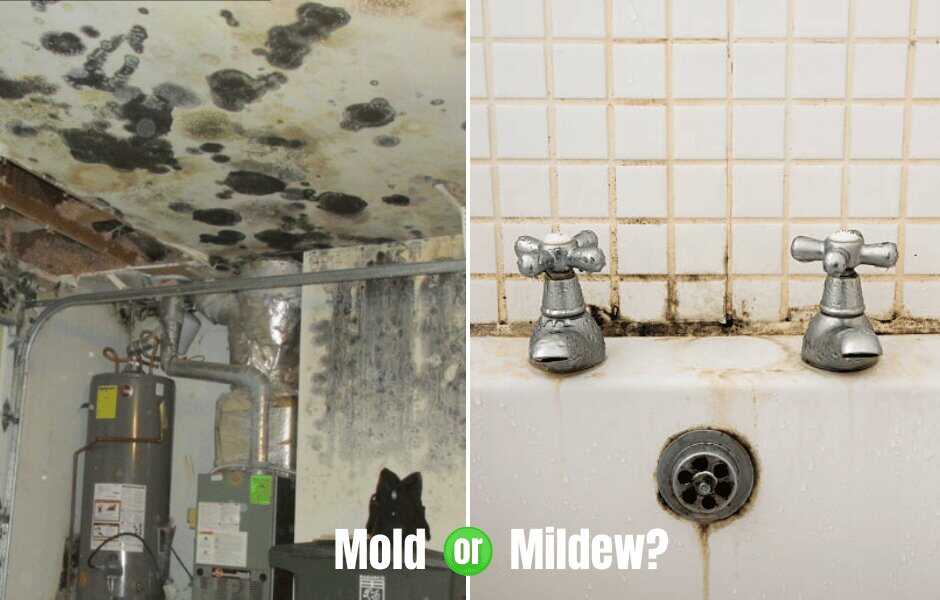
Is it Mold or Mildew?
Determining if your home has mold or mildew is a very important step, and it could save you a lot of time! This is because the removal and cleaning processes for mildew and mold are completely different – and one of them is much easier.
Signs It’s Mold
Mold is a kind of fungi that will grow just about anywhere there is warmth, darkness, and moisture. It appears furry or slimy, it is usually black and green (but can be red, according to Today’s Homeowner). It usually grows behind large appliances, furniture, and in attics and crawlspaces. Mold roots itself deep into the material it’s on, making it very difficult to just wipe off. Because it spreads quickly and roots deeply, a professional mold removal company is often required. You may have to look into hiring one, like the well-trusted Cleaner Guys.
Signs It’s Mildew
Mildew is actually a form of mold. However, it’s far less invasive than the molds described above. Mildew is usually grey or brown, often has a very small spot pattern, and is primarily found in showers, bathrooms, windowsills, and other nonporous hard surfaces that see a lot of moisture. Luckily, mildew is very easy to clean off! It does not root deeply into the surface it’s on – unlike other molds – and so usually all it takes is a strong cleaning chemical and a little scrubbing to remove it entirely. No need to call anyone!
What if I Found Mold in a Rental House?
Once you’ve found mold, one of your first concerns is naturally going to be who is responsible for mold in a rental house. The answer is it depends. Here’s what you need to know.

1) Landlord-Tenant State Laws
Is it illegal to have mold in a rental house? Absolutely not. In Washington State, however – the area where Cleaner Guys provides our services – the Residential Landlord-Tenant Act does not require landlords to remove all mold. It states only that the landlord must maintain the state of all structural components “in reasonably good repair so as to be useable.” (RCW 59.18.060)
Landlord-tenant laws in other states vary widely, and while Cleaner Guys is not certified to give any legal advice, we strongly advise you to look up the laws in your state in this matter.
2) Your Landlord’s Responsibilities
Your landlord is always where to report rental house mold first. However, if you’re in Washington State, as mentioned above, there are no laws requiring your landlord to fix the mold for you. Therefore, the best course of action is probably to get a professional mold inspection, to figure out the source of the mold. This will determine whether the mold is your fault, or your landlord’s, and can help facilitate a discussion about who should pay for the mold removal.
Can You Get Sick From Mold in Your House?
Yes, mold in your house can make you sick. Knowing the symptoms of mold sickness can be the first step to knowing if you have mold in your house. Any mold illness symptoms you may be showing can be a clue as to how severe your mold problem is.
Is mold in a house dangerous? Mold in a house is not good, but it’s not usually very dangerous. Is it safe to stay in a house with mold? It is safe to stay in a house with mold as long as you get it removed as quickly as possible. However, if you have severe sickness symptoms from the mold, you should consider staying somewhere else until your house is free of mold.
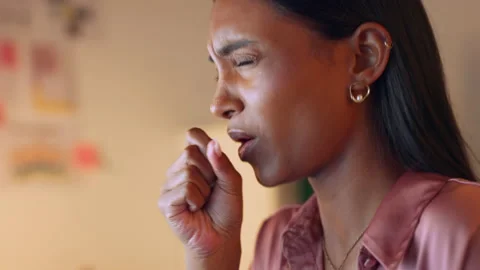
What are Signs of Mold Sickness?
Signs of mold sickness include symptoms such as:
Not everyone is sensitive to mold. Some people experience no sickness symptoms at all, even when very near mold. Others may have extremely severe reactions. Here are the recognized symptoms of mold sickness according to the CDC, in order from least to most severe.
- Persistent, abnormally long congestion or runny nose
- Unusual amounts of sneezing
- Itchy or red eyes or skin
- Unusual amounts of coughing
- Persistent, abnormally consistent headaches or migraines
- Trouble sleeping
- Upper respiratory infections
- Allergic reactions, including asthma attacks in those suffering with asthma.
Though most of these symptoms resemble the common cold, the main way to tell whether you have a cold or are experiencing mold sickness is the duration of the symptoms. The average lifespan of a cold is about 3-10 days. Any one of the mold sickness symptoms listed above can last for many weeks, because as long as the cause (mold) is still present, the symptoms will not go away.
What to Do If You Have Mold Sickness Symptoms
If you have any number of these symptoms, search your house thoroughly for mold. Look behind all large appliances and furniture, in the backs of all cupboards, in your attic, and around windowsills and other areas that can collect moisture. Check out our full list of the top sneakiest hidden places to find mold.
Does Mold In a House Go Away On Its Own?
No, mold in a house does not go away on its own. Mold is a fungus that roots deeply into whatever material it’s growing on, and like any organism, it will continue growing and spreading its roots further unless it is stopped. We have listed several methods for getting rid of mold below that we recommend.
How to Clean Mold
Different levels and types of cleaning are necessary depending on how large the affected area is. Figuring out what kind of mold cleaning techniques you’ll need for the mold in YOUR house is an essential first step.
The EPA says that if the mold patch is smaller than 3 feet by 3 feet, you can clean it yourself. However, in our decades of professional experience in mold removal, we would recommend getting professional help if the mold spreads farther than a 1 square-foot area. This is because we’ve seen mold root so deeply, that when there’s mold on walls or any other surface in your home, you’re probably only seeing a tiny part of what’s under the surface.
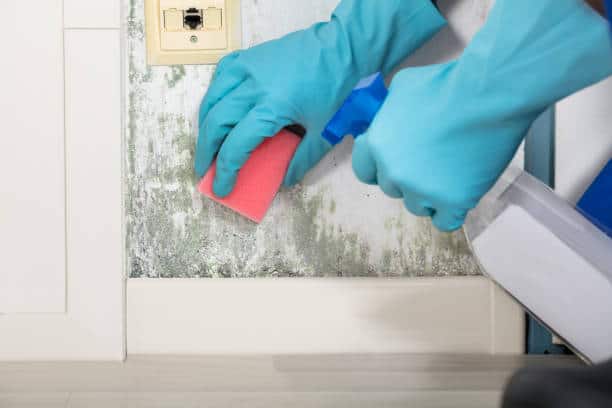
If the Affected Area is Small
If the mold in your apartment is about 1 square foot or smaller, you can safely try cleaning it yourself before calling a mold removal company like Cleaner Guys. According to Homes & Gardens, a popular home remedy you can try is spraying vinegar on the affected area and letting it sit for at least an hour, making sure the room is ventilated, and then scrubbing the mold off thoroughly. Be warned, however: we have not found vinegar to be effective on patches of mold larger than 1 square foot. The vinegar simply cannot penetrate deep enough.
Bleach is not an effective remedy for mold cleaning, despite what home improvement magazines may claim. In our experience as professional mold removal specialists, bleach only causes cosmetic damage to the surface, and cannot penetrate deeply enough to kill all of the mold.
The method we recommend for cleaning mold in small areas is purchasing a fungicide specifically designed to kill mold. Cleaner Guys recommends Fiberlock Shockwave, an unsponsored product we use in our own work.
If the Affected Area is Large
By our recommendation, if the mold you discover covers an area greater than 1 square foot, you should not attempt to clean it yourself. It is almost certainly too deeply rooted to be easily cleaned off. If you find mold in a rental house, the first thing you should do is call your landlord and let them know about it immediately. Negotiate with them whether they will pay for a mold removal service or if you will, usually depending on whether the cause of the mold was the landlord’s fault or yours. (See the above section on “Landlord Responsibilities” for more.) The best way to determine this is by getting a mold inspection, to lock onto the true cause of the mold. Learn about what to expect from the mold removal process here.
How to Prevent Future Mold Growth
Taking steps to make sure your home is an inhospitable place for mold is essential moving forward. You certainly don’t want to have to deal with this kind of stress again! Luckily, there are some simple things you can keep track of that will greatly reduce your chances of getting mold again in the future.

What Causes Mold to Grow in a House?
Mold growing in houses is caused by 4 things: darkness, moisture, warmth, and oxygen. If there are areas like these in any indoor space, mold can sprout up overnight. Mold does not typically appear without unusually high amounts of moisture, such as a leak, spill, flood, or other kind of water damage. However, there are some simple things you can do to make mold spores skip rooting in your home.
How to Prevent Mold From Growing in Your House
- Keep Indoor Humidity Low. We agree with the CDC’s recommendation to keep your indoor humidity ideally lower than 50%. This means less moisture for mold to grow in. Lower humidity can be achieved with a dehumidifier.
- Take Care of Leaks Immediately. If you live in a rental home, alert your landlord about leaks and damaged window sealings immediately, pressing them about it as necessary and pointing out that it will cause mold they may have to fix.
- Ventilation, ventilation, ventilation! Try to have some kind of airflow in every room. Ceiling fans, freestanding fans, and even opening a window will do. Stagnant air encourages mold growth.
- Regular Cleaning. Mold feeds on organic materials like dust and crumbs — so don’t give it any!
Key Takeaways
Mold can unfortunately grow just about anywhere given the right conditions, and it spreads incredibly quickly. But with this ultimate guide, you can be empowered to know not only what to do if you find mold in your house, but also how to prevent it from happening!
If you find yourself in the unfortunate position of needing a professional mold inspection or removal company near Mount Vernon WA, consider Cleaner Guys as a high-quality, well-trusted option. We’re proud to both keep our prices lower than other such companies, and still deliver top-notch workmanship.
Disclaimer: This article is for informational purposes only. No part of this article is medical or legal advice, and may not be used as such. For all serious medical matters, consult your doctor. For all serious legal matters, consult your legal advisor. This article contains Cleaner Guys’ experience and opinions only.
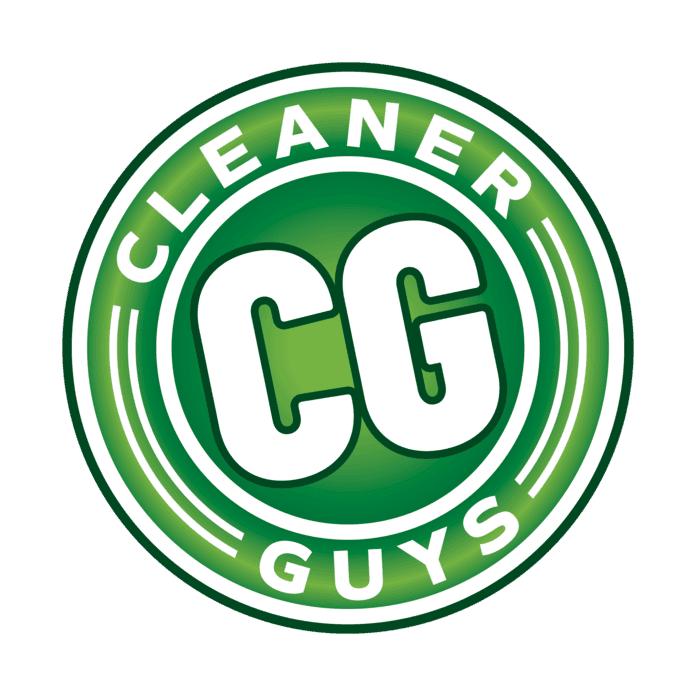
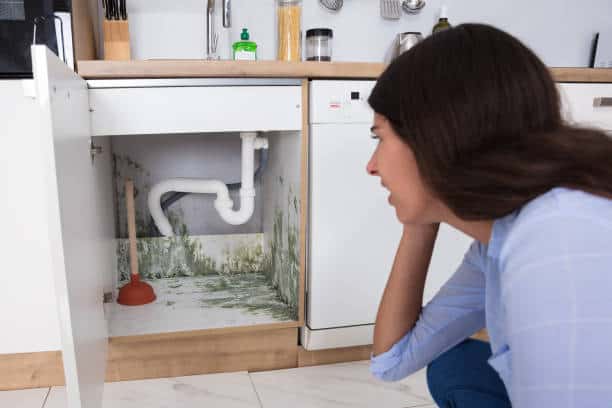

This Post Has 3 Comments
I never knew that mold is a contaminant that can form around your property without you knowing. My friend mentioned his plans to invest in a countryside home this year. I will talk to him about the perks of mold testing and removal so he can avoid the problems caused by mold exposure.
The humidity issues that can cause mold really feel like things we should try and solve. That’s something that we might really need some help with to prevent as much as possible, so we should be a lot more preventive about this. Once I find a mold damage expert in the area, I’ll ask them for some assistance with this for sure.
This post has been extremely helpful to me. Thanks.